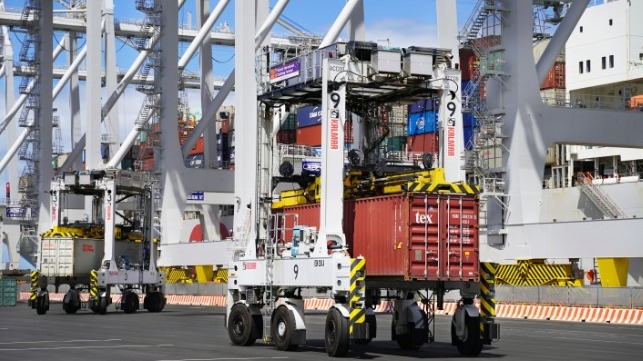Automated Waterborne Transportation Project Underway With EU Support

The effort to develop a connected automated waterborne transport took an important step forward as Cargotec’s Kalmar and MacGregor, leaders in cargo and load handling solutions for ports, terminals, distribution centers, and heavy industry, joined the EU-supported initiative as the technology providers.
“Increasing the level of automation in cargo handling onboard vessels and in ports is critical in terms of developing waterborne logistics systems in inter-European cargo transport,” said Janne Suominen, Manager, Offering Development, MacGregor. “We expect that our involvement in AEGIS will provide valuable input for our strategic initiatives to develop world-leading cargo handling technology for connected and automated transport.”
The Advanced, Efficient and Green Intermodal Systems (AEGIS) is a three-year project focused on integrating smaller ships, inland transport and short-sea shipping with larger terminals to create a completely new European transport system. The goal is to develop more flexible and user-centric transport, improve services to rural and urban areas, and revitalize regional ports and city terminals.
“By participating in this project we want to help smaller ports and inland cargo logistics operators to address the challenges they are facing, which include congestion and scaling problems due to heavy road traffic, ever-larger vessel sizes and increasingly limited storage space as well as labor cost and availability,” said Lasse Eriksson, Vice President, Technology, Kalmar Mobile Solutions.
A three-year project funded by the EU’s Horizon 2020 Research and Innovation program, AEGIS recently announced that it had has secured a €7.5m grant. The project was selected by the EU Commission to show that autonomous ships and port automation technologies can make waterborne transport much more flexible and user-oriented while further reducing the environmental impact of transport in the EU.

that matters most
Get the latest maritime news delivered to your inbox daily.
AEGIS will develop three case studies located in North Europe that represent typical inter-European transportation modes. One will explore the use of small cargo shuttles to link coastal container ships to rural and urban destinations work with North Sea Container Line in cooperation with the Port of Trondheim. The second will involve DFDS and will link Ro-Ro short sea services in BeNeLux to inland waterways. The third will examine how existing small and medium-sized ports can use automation to facilitate the transfer of cargo from trucks to sea working with the ports of Aalborg and Vordingborg.
AEGIS will be coordinated by SINTEF Ocean in Denmark along with the Institut für Strukturleichtbau und Energieeffizienz GmbH (ISE), the Technical University of Denmark, (DTU), and Aalborg University.
